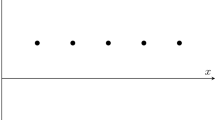Abstract
In her recent paper, “A Defense of Substance Causation,” Ann Whittle makes a case for substance causation. In this paper, assuming that causation is a generative or productive relation, I argue that Whittle’s argument is not successful. While substances are causally relevant in causal processes owing to outcomes being counterfactually dependent upon their role in such occurrences, the real productive work in causal processes is accomplished by the causal powers of substances.
Similar content being viewed by others
Notes
I have numbered the premises to make it easier to keep track of them.
See, for instance, Anjan Chakravartty (2007), Heil (2003) and Heil (2012), Rögnvaldur Ingthorsson (2002), George Molnar (2003), C.B. Martin (2008), Stephen Mumford and Anjum (2011), and Neil Williams (2014). There are differences between these authors, but they share enough in common for their general proposals to all count as variants of the same approach to thinking about the metaphysics of causation.
O’Connor and Jacobs (2013) and Michael Brent (forthcoming) defend similar views.
Exceptions I have not discussed would involve substances that have powers that do not require any reciprocal manifestation partners to be manifested. So, for instance, a quantity of strontium-90 is disposed to beta-decay and manifests its disposition absent any manifestation partner.
Thanks to Michael Brent, John Heil, and Neil Williams for helpful comments on earlier versions of this paper.
References
Brent, M. (Forthcoming). Agent causation as a solution to the problem of action. Canadian Journal of Philosophy.
Chakravartty, A. (2007). A metaphysics for scientific realism. New York: Cambridge University Press.
Dyke, H. (2007). Metaphysics and the representational fallacy. New York: Routledge.
Heil, J. (2003). From an ontological point of view. New York: Oxford University Press.
Heil, J. (2012). The universe as we find it. New York: Oxford University Press.
Ingthorsson, R. (2002). Causal production as interaction. Metaphysica, 3, 87–119.
Kim, J. (1976). Events as property exemplifications. In M. Brand & D. Walton (Eds.), Action theory (pp. 159–177). Boston: D. Reidel.
Kim, J. (2005). Physicalism, or something near enough. Princeton: Princeton University Press.
Lowe, E. J. (2008). Personal agency: The metaphysics of mind and action. New York: Oxford University Press.
Martin, C. B. (2008). The mind in nature. New York: Oxford University Press.
Martin, C. B., & Heil, J. (1999). The ontological turn. Midwest Studies in Philosophy, 23, 34–60.
Molnar, G. (2003). Powers: A study in metaphysics. New York: Oxford University Press.
Mumford, S., & Anjum, R. (2011). Getting causes from powers. New York: Oxford University Press.
Nichols, S. (2004). The folk psychology of free will: Fits and starts. Mind and Language, 19, 473–502.
O’Connor, T., & Jacobs, J. (2013). Agent-causation in an neo-Aristotelian metaphysics. In S. C. Gibb, E. J. Lowe, & R. D. Ingthorsson (Eds.), Mental causation and ontology (pp. 173–192). New York: Oxford University Press.
Whittle, A. (2016). A defense of substance causation. Journal of the American Philosophical Association, 2, 1–20.
Williams, N. (2014). Powers: Necessity and neighbors. American Philosophical Quarterly, 51, 357–371.
Author information
Authors and Affiliations
Corresponding author
Rights and permissions
About this article
Cite this article
Buckareff, A.A. A Critique of Substance Causation. Philosophia 45, 1019–1026 (2017). https://doi.org/10.1007/s11406-017-9855-7
Received:
Accepted:
Published:
Issue Date:
DOI: https://doi.org/10.1007/s11406-017-9855-7



